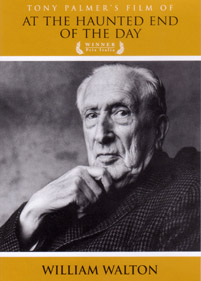Sir William "Turner" Walton est né en 1902 et mort à Ischia (Italie) en 1983. Il étudie l'écriture en autodidacte les œuvres de Stravinsky, Debussy, Sibelius et Roussel. En 1919, il écrit sa première œuvre, un quatuor pour piano et cordes. Durant ces années, il se lie d'amitié avec les poètes Sacheverell Sitwell et Siegfried Sassoon. La fratrie Sitwell l'héberge dans leur manoir à Chelsea. Edith Sitwell joue à Londres un rôle analogue à celui de Jean Cocteau à Paris. En 1929, Paul Hindemith crée son concerto pour alto. Son oratorio biblique Belshazzar's feast, composé en 1931, le place dans la lignée des maîtres britanniques, de Haendel à Elgar. On le considère comme compositeur officiel du Royaume à l’occasion du couronnement du roi Georges VI puis en 1953, à l’occasion du couronnement d’Elisabeth II avec son œuvre Orb and Sceptre. En 1939, Jascha Heifetz le sollicite pour écrire un concerto pour violon. Après la guerre, William Walton s’intéresse au cinéma et compose des œuvres pour la trilogie shakespearienne de Laurence Olivier : Henry V en 1944, Hamlet en 1947 et Richard III en 1956. Il aborde l’opéra en 1954 avec Troilus and Cressida, créé à Covent Garden. En 1951, il est anobli et reçoit l'Ordre du Mérite en 1962. Il passe les dernières années de sa vie sur l’île d’Ischia avec sa femme Susana, tous deux isolés du reste du monde. Ce film sur le compositeur William Walton mérite une grande attention. Avec des entretiens avec Yehudi Menuhin, Julian Bream, Iona Brown, Ralph Kirshbaum, Yvonne Kenny, John Shirley-Quirk, Carmen de Sautoy, ce documentaire a remporté, à fort juste titre, un Award en 1981. Personnage anglais avec une diction charmante, un visage buriné par les ans, William Walton retrace toute sa carrière. Document rare et exceptionnel, Tony Palmer ne met rien en scène ici mais obtient les témoignages du compositeur. Documents de première main donc. Hélas, deux défauts majeurs viennent écornés ce document d’importance : une digitalisation médiocre et aucun sous-titres !
Yannick Rolandeau Sir William “Turner” Walton was born in 1902 and died in Ischia (Italy) in 1983. He studied writing on his own by studying the works of Stravinsky, Debussy, Sibelius and Roussel. In 1919, he wrote his first work, a quartet for piano and strings. During these years, he became friends with the poets Sacheverell Sitwell and Siegfried Sassoon. The Sitwells lodged him in their mansion in Chelsea. Edith Sitwell at the time played a role in London that was similar to the one played in Paris by Jean Cocteau. In 1929, Paul Hindemith first performed his concerto for alto. His Biblical oratorio, Balthazar’s Feast, composed in 1931, put him in the in the same line of British masters from Haendel to Elgar. Upon the crowning of King George VI, he was considered the official composer of the kingdom, as he was in 1953 when Elisabeth II was crowned, for which he wrote his work Orb and Sceptre. In 1939, Jascha Heifetz asked him to write a concerto for violin. After the war, William Walton became interested in motion pictures and composed works for the Shakespearian trilogy by Laurence Olivier: Henry V in 1944, Hamlet in 1947, and Richard III in 1956. He wrote his first opera in 1954, Troilus and Cressida, first performed in the Covent Garden. In 1951, he was knighted, and received the Order of Merit in 1962. He spent the last years of his life on the island of Ischia with his wife Susana, both of them isolated from the rest of the world. This film on the composer William Walton is well worth viewing. With its interviews of Yehudi Menuhin, Julian Bream, Iona Brown, Ralph Kirshbaum, Yvonne Kenny, John Shirley-Quirk, and Carmen de Sautoy, this documentary most deservedly won an award in 1981. An English character with charming diction and a face weathered by the years, William Walton recounts his entire career. In this rare and exceptional document, Tony Palmer, rather than narrate the composer’s life, obtains recollections by the composer himself. These source documents, unfortunately, are marred by two major defects: a mediocre digitalization and no sub-titles! Translation Lawrence Schulman | Disponible sur |  |
|  |